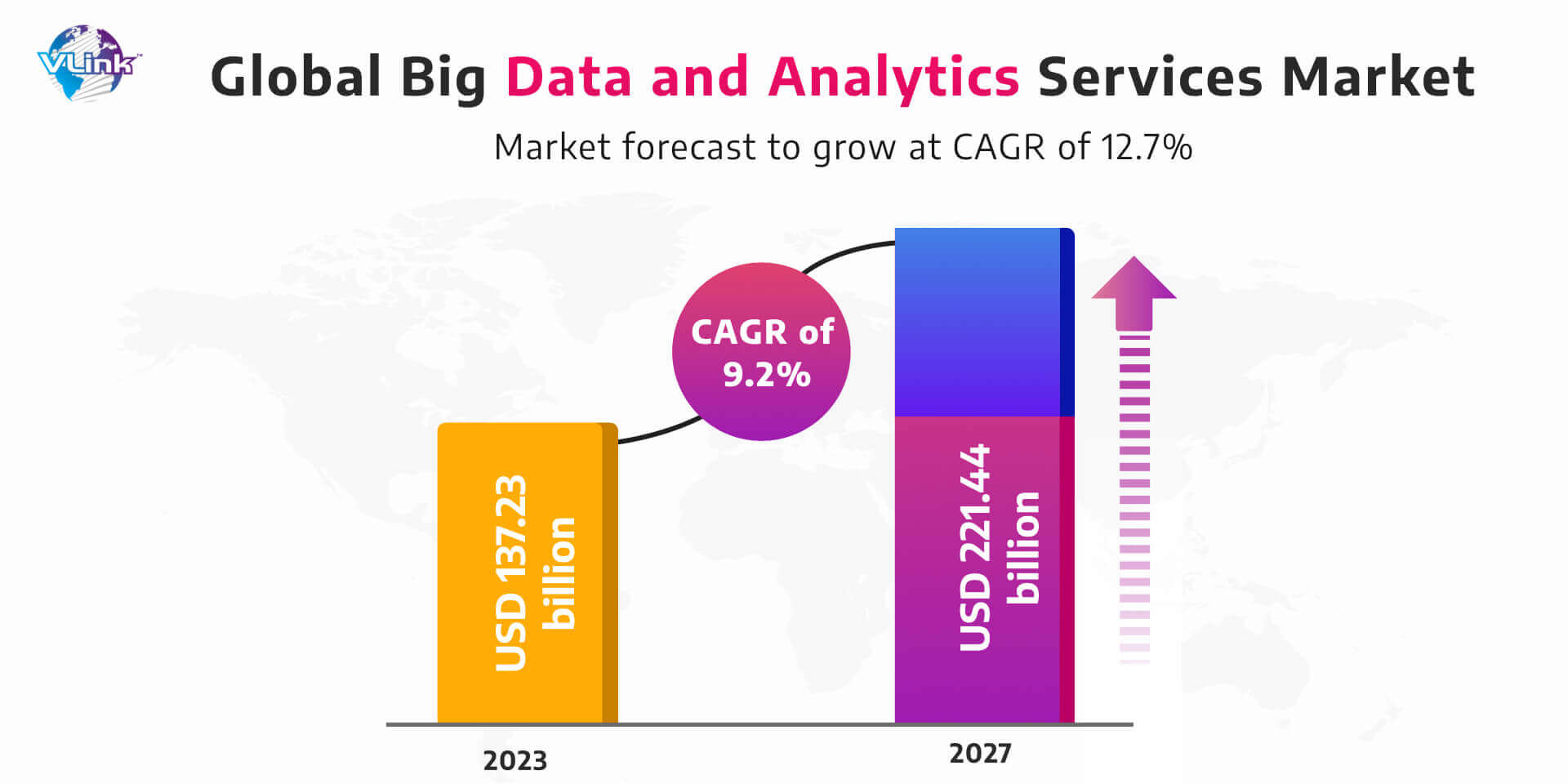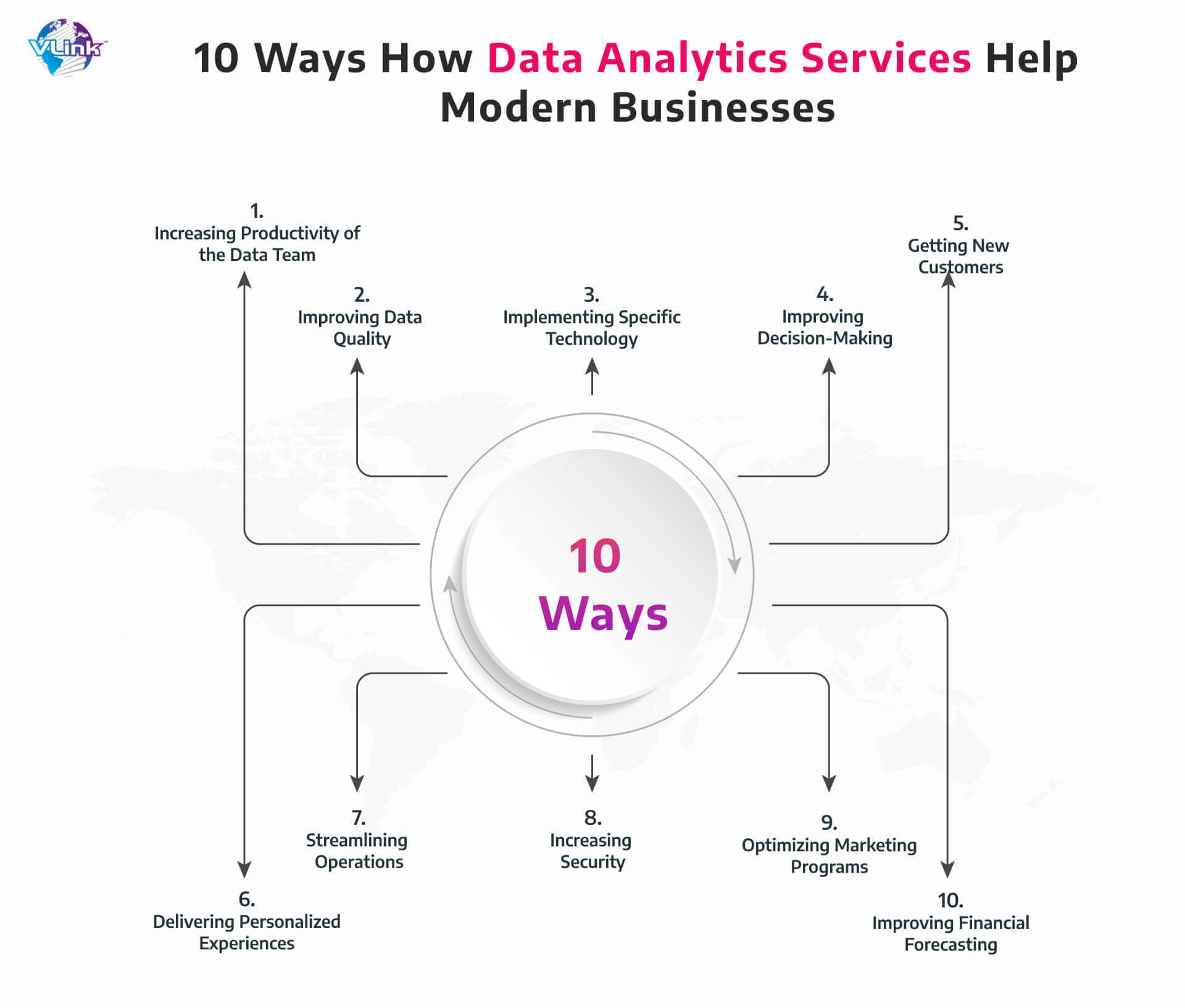Earlier, when ETL (Extract, Transform, and Load) systems functioned on on-premises databases, an organization’s data team consisted of two key positions: Database Developers and Business Analysts. Then, the role of Data Engineers (evolved from Database Developers) and the demand for Data Scientists surfaced with the emergence of deep learning and big data.
Now, the accelerated processing power of data warehouses and the adoption of cloud-based warehouse services have eliminated the need for the data to be transformed before being loaded into the data warehouse. As a result, the ELT (Extract, Load, and Transform) paradigm has occurred, creating a new role – Data Analytics Engineering.
The global big data and analytics services market is $137.23 billion in 2023 and will grow $221.44 billion by 2027 at a CAGR of 12.7%, as shown in figure:

This blog will help you understand this new role, its responsibilities, and how the expertise of analytics engineering can help your business achieve its goals.
What Is Data Analytics Engineering?
The role of data analytics services emerged with the adopting of the ELT approach in the data integration landscape. Data now sits in the warehouse before being transformed into actionable insights useful for businesses. This gap between data extraction and transformation created room for accuracy problems and potential data breaches.
Hence, to defend against these vulnerabilities, many companies have implemented compliance protocols that require the data to be encrypted, cleansed, and treated for safety before landing in a warehouse. Today, more sophisticated ETLT solutions have cropped up to help businesses meet the objective.
An analytics engineer's new and evolving role is to model the organized, well-tested datasets that enable the company to find answers to pesky questions. These sets are built and documented in a way that communicates effectively with business users and gives consistent and reliable answers to all data consumers.
Analytics engineering for business is a merger of business analytics and engineering. An analytics engineer has an unmatched level of technical expertise in leveraging the best practices of software engineering, such as version control and CI/CD, combined with a strong business sense.
10 Ways How Data Analytics Services Help Modern Businesses

Increasing the Productivity of the Data Team
The role of analytics engineering has made data teams more efficient and is driving business innovation using in-warehouse data transformation. Since analytics engineers understand the value of data in decision-making, they can conjure up the possible use cases of raw data and accordingly lead its transformation.
Improving Data Quality
Analytic engineers have a crucial role in building actionable datasets. It results from their cross-functional skill set, meaning they understand the science behind data and the business goals. It results in superior quality data compared to the data generated through a segmented workflow of a traditional data team.
Implementing Specific Technology
Analytic engineers are well-versed with modern tools, such as DBT, that require the person to be comfortable with SQL and software engineering workflows. This intelligence of an analytics engineer allows the organization to adopt new data strategies and directions and get maximum ROI from the best software development tools.
Improving Decision-Making
Data analytics offers the advantage of enabling leaders to enhance their business decision-making by relying on concrete information. In an environment where data is pivotal in decision-making, discussions incorporate data from the outset.
Stakeholders proactively inquire about the insights data provided on a particular subject, thereby contributing to decisions that yield more substantial outcomes.
Getting New Customers
Losing the attention of potential customers can adversely affect a business's growth and prosperity. Data analytics has the potential to enhance customer engagement, boost conversion rates, and drive new customer acquisitions.
A company can leverage performance data to evaluate the effectiveness of its content or monitor customer responses to email and social media campaigns. This information helps identify which messages are most effective in resonating with the audience and driving conversions.
With these insights, the business can formulate potent marketing strategies and design approaches that enhance customer experiences, ultimately leading to an uptick in customer acquisitions.
Delivering Personalized Experiences
Crafting tailored experiences through data analytics, which involves extracting insights from customer, sales, and marketing data to understand customer preferences, is becoming increasingly crucial.
As per McKinsey, there is an expectation from 71% of consumers to receive customized services and interactions, and providing personalization can lead to revenue increases of 10% to 15%.
A business that fails to utilize its data for delivering such experiences may overlook chances to enhance its performance and customer results.
Streamlining Operations
Enhancing a business's operational efficiency can lead to cost reductions, improved overall performance, and a more robust financial position. One practical approach to achieving these objectives involves harnessing the power of operational analytics.
Operational analytics brings value to business operations by pinpointing areas of concern and streamlining processes. By leveraging predictive analytics, crucial data insights can be used to proactively detect potential issues with machinery and equipment.
As a result, it reduces repair expenses and mitigates the likelihood of unforeseen downtime incidents.
Increasing Security
In cybersecurity, professionals employ data analytics tools and technologies to continuously oversee the location of critical data, its utilization, and the individuals interacting with it.
For instance, an automated data analytics method called "data discovery and classification" can effectively pinpoint sensitive information, scrutinize data usage patterns within business systems, and evaluate and rectify vulnerabilities such as outdated software or misconfigured systems.
Optimizing Marketing Programs
Utilizing data analytics can enable businesses to optimize the return on their marketing expenditures. When assessing or crafting a marketing campaign, data analytics provide valuable insights to help decision-makers identify the most valuable aspects of a marketing strategy.
For instance, information about the factors influencing consumer behavior and purchasing habits can unveil the most effective marketing channels.
Additionally, this data can offer crucial business metrics that empower marketing teams to make informed choices regarding future marketing initiatives. With this knowledge, marketing leaders can adapt their plans to prioritize those areas that yield the highest return on investment (ROI).
Also Learn: how data science and big data analytics is transforming the world.
Improving Financial Forecasting
In both thriving markets and times of economic downturn, businesses need to have a comprehensive grasp of their financial position. While it is impossible to anticipate every potential scenario that could affect a company's financial well-being, data analytics is pivotal in establishing financial resilience.
By analyzing data encompassing sales patterns, expenditure details, consumer actions, supply chain dynamics, demand fluctuations, and market sentiment, businesses can navigate even the most challenging market conditions.
This data-driven approach enables companies to formulate forecasts regarding their near and distant financial prospects and empowers them to implement strategies to optimize their financial outcomes.
Get Data Analytics Engineering Services with VLink!
Despite being a relatively new domain, the future of data analytics engineering for businesses is quite exciting. As the need for well-modelled, accurate data and its areas of application rises, organizations will want to hire additional data talent, i.e., analytics engineers.
Dedicated data analytics team will increase workflow efficiency, elevate the amount and quality of insights obtained from data, and add a competitive edge to your business.
To embrace and evolve with this fast-approaching future of analytics engineering, VLink can help you adopt innovative analytics engineering toolsets and best practices.
We are your trusted, prominent data consulting services provider that can help you benefit from the data engineering tools, best practices, and multi-faceted expertise of analytics engineering.
Our dedicated engineers offer various data engineering consulting services, including ETL, reporting and instrumentation tools, predictive analytics, and other solutions. Our IT solutions facilitate strategic partnerships and optimize value chains to meet industry-specific goals for organizations of all sizes. Contact us to schedule a consultation today.
Frequently Asked Questions
Traditionally, a data team consisted of three prominent roles: engineers, analysts, and scientists. Let’s take a closer look at their work:
Data Engineers build and manage infrastructure by extracting data from databases and SaaS tools. The data is then transformed, loaded into a data warehouse, and made accessible across the organization.
Data Analysts visualize the data through dashboards and reports to enable stakeholders to find the answers. They also perform exploratory analysis.
Data Scientists extract value from data using statistics and machine learning to solve optimization problems, run A/B experiments, build prediction models, and do more.
Data analytics engineering experts are responsible for designing, developing, and maintaining data pipelines, databases, and infrastructure. Their roles include data integration, ETL (Extract, Transform, Load) processes, data quality assurance, and ensuring data accessibility for analysts.
They collaborate with data scientists and analysts to provide clean, reliable data for analysis and reporting.
To hire a data analytics engineer, you need to follow these ways:
- Define the role and responsibilities clearly.
- Look for candidates with relevant education and experience.
- Assess technical skills in data engineering, ETL processes, database management, and data modelling.
- Evaluate problem-solving and teamwork abilities.
- Consider communication skills for effective collaboration with data scientists and analysts.
- Check for knowledge of relevant tools and technologies like SQL, Python, Hadoop, and cloud platforms.








